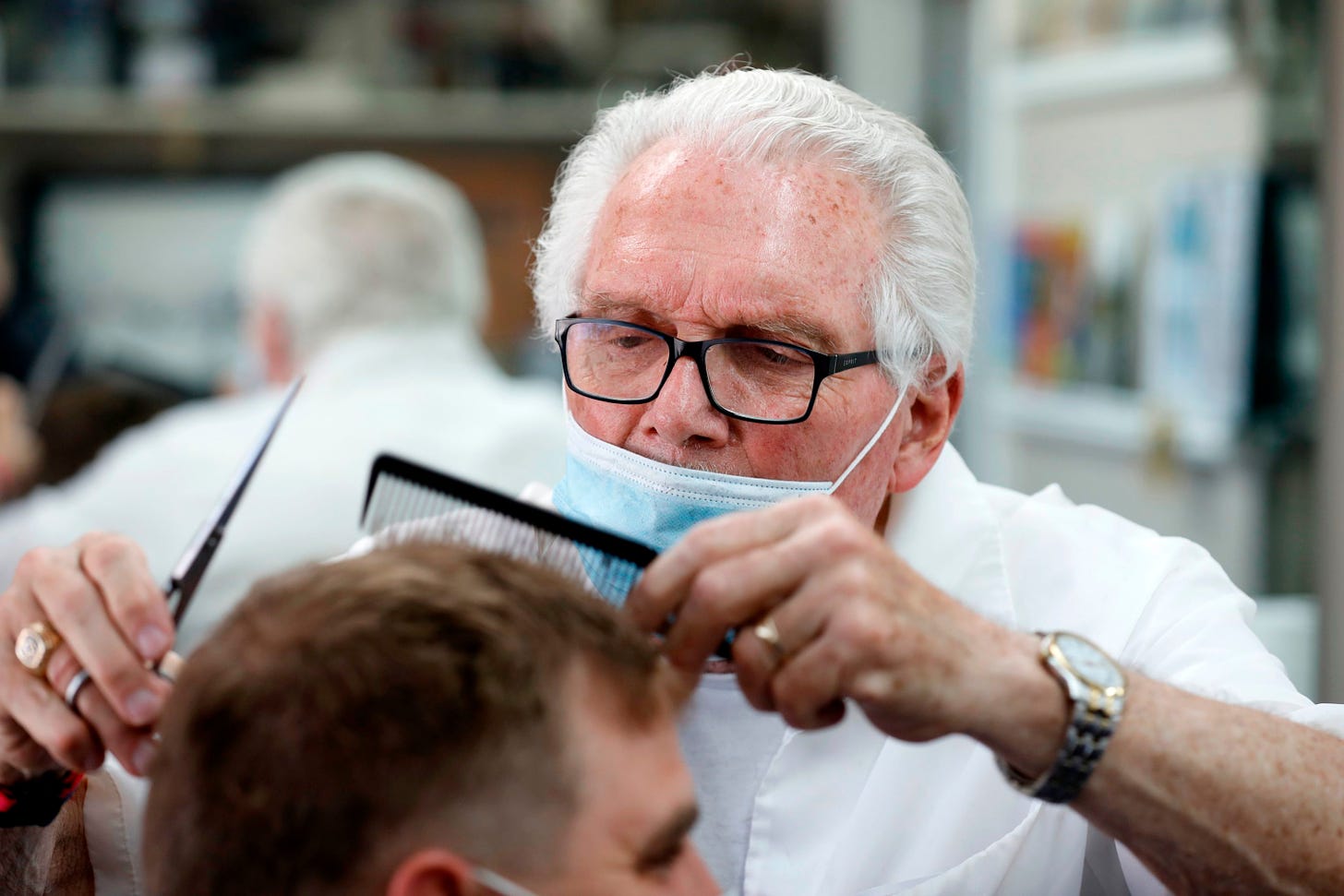

In 1918, at the height of the influenza pandemic, the Owosso Casket Company was hard at work, churning out more than 150 burial caskets per day without any hope of denting its substantial backorders. The premier purveyor of mortuary supplies for its time, the casketworks provided the final arrangements for U.S. Presidents William McKinley and Benjamin Harrison, among other notables, while serving as the primary industry of its small community. The factory closed down in the mid-century, leaving the quiet Michigan town of 15,000 from which it took its name with a landscape of aging industrial buildings and an outsized number of funeral parlors and monument salesmen.
Today, however, less than half a mile away from the old casketworks, business of a different kind is booming at Karl Manke’s salon Barber & Beauty. The shop’s 77-year-old owner has been rapidly making the transition from local to national celebrity for the cause of bucking the COVID-19 lockdown.
Since reopening his shop on May 4 in defiance of executive orders from Michigan governor Gretchen Whitmer, Manke has attracted protests, interviews, and nearly a dozen GoFundMe campaigns. The largest of these has raised more than $70,000 as of this writing from donors all over the country to cover Manke’s “legal fees, unconstitutional citations and financial loss due to unlawful citations etc.” On May 18, a rally was held in his honor by visiting COVID celebrity Shelley Luther (no relation to the author), whose similar act of defiance had earned her a week’s jailtime in her native Texas, and had subsequently helped her raise more than a half-million dollars via crowdfunding.
Manke’s legal jeopardy is not yet quite as serious as Luther’s was. Shiawassee County sheriff Brian BeGole had already joined five other Michigan sheriffs in refusing to enforce the Governor’s order and county circuit judge Matthew Stewart has likewise rebuffed attempts by Michigan’s department of health and human services to obtain an order to shut down the salon. This left Governor Whitmer and Attorney General Dana Nessel little recourse against Manke but to direct the state police to issue citations and to request that regulators suspend his occupational license, which they did on May 13. “Anytime you have a barber or other professional providing services to numerous citizens in close proximity to each other and those citizens are then returning to their various residences, there is a risk of contracting and spreading the virus,” Nessel said in a statement reported by the New York Times.
Among the reasons state health officials might be so concerned: Located within a mile of Manke’s shop is the county’s largest medical center, Owosso Memorial Hospital, which has handled the majority of Shiawassee’s 237 COVID19 cases (26 of which proved fatal). From Manke’s lot on Main Street, life-flight helicopters can be seen and heard above the treeline with increasing frequency taking off and landing at the facility as patients are transported to other better-equipped hospitals around the state. That the county’s 70,000 residents have seen relatively few deaths—from a disease that has to date killed 100,000 people across the country—has been a rare spot of good news in a state otherwise very hard hit in the crisis. Whether that luck will hold, with hundreds of protesters, militia members, and activists from out-of-state having congregated at the local barbershop, remains to be seen, particularly as concern over “Superspreader events” begins to inform the debate among epidemiologists about public policy during the pandemic.
While Manke had initially declared he would “be open until Jesus walks in or until they arrest me,” he shuttered the business on May 15 after receiving notice by mail of his suspended license. During the 10 days the salon was operating, Manke told the Times, he worked more than 90 hours, seeing hundreds of customers, covering his mouth and nose with a mask, and placing his tools under a UV lamp between sittings. Somehow amid this flurry of activity he also found time to give dozens of interviews, including appearances on Fox News and the Glenn Beck program, where, after touting his refusal to dip into his retirement savings or to seek government assistance as alternatives to his predicament, he compared his plight to that of Europe’s Jews during World War II, which apparently made for an excellent segue into plugging his self-published fiction.
And this is where we see another side of the small-town barber. While cutting hair and acting as a landlord—he rents apartments in the upper floors of his shop—are apparently his main income sources, his true passions are writing and history. As he puts it in the teaser for one of his books, “the memory of things past is much like a worm that doesn’t die,” and this fascination with the past is very much on display in the ten titles he’s written over the years.
Here’s how Manke’s website introduces Age of Shame, his self-published 2014 Romeo-and-Juliet tale of love between a German and a Jew in the middle of the Holocaust: “Both are suspicious of the other because of their opposing ethnicities, but they soon come to a realization that neither of their traditions had ever allowed them to examine. . . . Able to set their prejudices aside, they conjoin in an unseemly relationship and make their way through this labyrinth of insanity.” Manke calls his book “an excellent WWII epic story told from several different view points including both the German and Jewish perspective.”
If that’s not quite to the reader’s taste, there are other stories on offer: From Jewish gangsters in the Prohibition era and PTSD among Vietnam veterans, to murderous railroad hobos and the rise and fall of hippies, Manke’s oeuvre covers a broad array of topics, musing over each with homespun prose and a flair for the dramatic. Also of particular note is 2011’s Unintended Consequences, which has a ripped-from-the-headlines feel for Owosso locals. Set in the town of Argus—the Owosso local paper is the Argus Press—the story puts the town drunk, “Swiggy Swiggens,” on a deadly collision course with a local anti-abortion protester. While Owosso’s history is notable for a few things—it was the birthplace of Thomas E. Dewey and early-20th-century author James Oliver Curwood, and it merited brief condemnation in the autobiography of Malcolm X for having been a sundown town—its most recent source of notoriety was its misfortune as the site of a 2009 shooting spree that claimed the lives of two men, one of them an anti-abortion protester who habitually picketed schools, clinics, and government buildings around the town. The crime had prompted a plea for political tolerance from then-president Obama, a notion that seems almost quaint in hindsight as protesters with rifles surround the statehouse in Lansing and rally on Main Street in Owosso to support Manke’s stand against the governor.
While his legal challenge to the suspension of his license is pending, Manke has been keeping busy, participating on May 20 in a protest dubbed “Operation Haircut” at the capitol in Lansing, where he cut hair for attendees and spoke to the assembled crowd. In video of the event, which was organized by the Michigan Conservative Coalition and Bikers for Trump, Manke can be seen in his barber’s coat addressing participants from the “Trump Unity Bridge,” a Trump-themed parade float towed in for the occasion. “You know, the governor has made me who I am,” he told the crowd, “an international symbol of freedom!” Over Memorial Day weekend, Manke’s site was overhauled to reflect his newfound fame, including a merchandise section selling “America’s Barber” T-shirts—bearing Manke’s likeness flanked by barber poles, among other designs—starting at $30 a piece.
Meanwhile, President Trump has made Michigan’s Democratic governor a particular focus of his ire as he attempts to bring a premature end to the coronavirus lockdowns, and Manke has tapped into that sentiment, referring to the governor as “Mother Whitmer” and denouncing her measures against him as vindictive overreach. “I’m the male, I’m the husband, I’m the father . . . and she’s not my mother,” he told the Lansing State Journal in a videotaped statement. At the May 20 rally, Manke was more forceful, likening his experience again to that of the Jewish characters in his Holocaust epic: “They willingly got into those cattle cars. I refuse to get into a cattle car!”
Despite the stakes implied, Manke seems to be enjoying the attention his spat with Whitmer has brought him, telling Fox News in a May 22 interview “I’ve become a worm in her brain, and I don’t mind that.” That sounds like the perfect motto for our era of cable-news controversy, social-media celebrities, and inescapable grifterhood.











